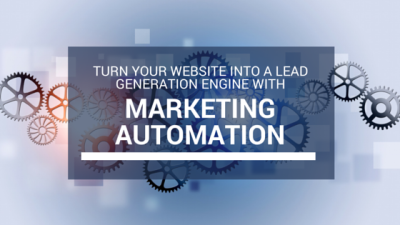What exactly is the purpose of your website?
Sure, your website serves as the introduction of your brand to potential consumers – but does it also fuel the sales apparatus inside your company?
Used correctly, the organic and paid traffic that you receive to your website can be your most powerful source of leads – it just takes a bit of technical savvy and the right software to ensure that you gain all the information that you need to contact and convert your web visitors upon their arrival.
Marketing automation systems can turn your website into a real engine of growth for your company’s marketing and sales department – optimizing the “funnel” that you use to deliver sales-ready leads to your sales representatives and generating measurable revenue for your company.
What is Marketing Automation?
At its core, marketing automation is the use of technology to streamline interaction with customers and prospects – usually through a combination of channels.
Your marketing automation strategy may be as simple as a single form that encourages website visitors to sign up for a free trial, or it might be ultra-complex and involve dozens of different email nurture campaigns that are each targeted at a different segment of your market.
There are quite a few marketing automation systems on the market today – primarily designed for B2B companies. Marketo, Pardot, Hubspot, and Eloqua are the most popular systems – but there are many more that serve niche industries and smaller companies.
While marketing automation software is expensive, it can be a great investment in the future of your company, and it can dramatically cut down on the amount of time that your marketing/sales teams spends trying to get their campaigns off the ground.
With the ability to measure the ROI of your individual marketing campaigns as they send leads through your sales process, you will also be able to optimize your sales spending so you no longer throw money away on marketing channels that aren’t working for you.
Capturing a Lead
Marketing automation relies on turning website visitors into actionable leads – with contact information that you can use to follow up.
This usually means gaining a phone number or an email address through some kind of sign up form – although many companies also require company information and a job title as part of their pre-qualification system.
There are many ways that you can capture a lead on your website. Some companies use simple contact forms or trial registration forms to convert website visitors, although you might see more success providing something of value (like an eBook or a Whitepaper) as an incentive for people to share their contact information.
Even if someone isn’t quite ready to make a purchase, their contact information is still valuable to you because you can send them emails and make them part of targeted nurture campaigns that are designed to keep your company in their mind while they wait for their next budget cycle. And we all know that B2B sales cycles are long, so staying top of mind with your prospective customer is important.
Scoring and Qualification
Of course, not everyone that visits your website is going to be someone that you actually want to contact.
In fact, the majority of your web visitors may be irrelevant for your sales interests – especially if you are dealing with an expensive product or service or a particularly niche market.
If you simply were to pass along the contact details of every single person that filled out your web forms to your sales reps, you would be creating a great deal of hassle for them as they are forced to call (and disqualify) every single person to come out of marketing’s lead funnel.
On the other hand, marketing automation systems allow your marketing department to work with the sales department to set up filters and scoring metrics that allow you to sort leads by priority – only passing over the leads that have shown an active interest in your company and fit some kind of demographic portfolio.
For example, you might assign some points for a job title that is relevant to your company, some points for a target industry, and some points for downloads and website visits – and when a lead hits a scoring threshold then he/she is automatically passed to sales to be followed up with.
Should you automate follow up on all or some of your web leads?
Should you use email to stay relevant and touch base with prospects over time, feeding them the information they need during the sales cycle?
Do you want to automate notifying sales reps when a lead is ready to be called?
If so, then marketing automation might be a good fit for your company.









